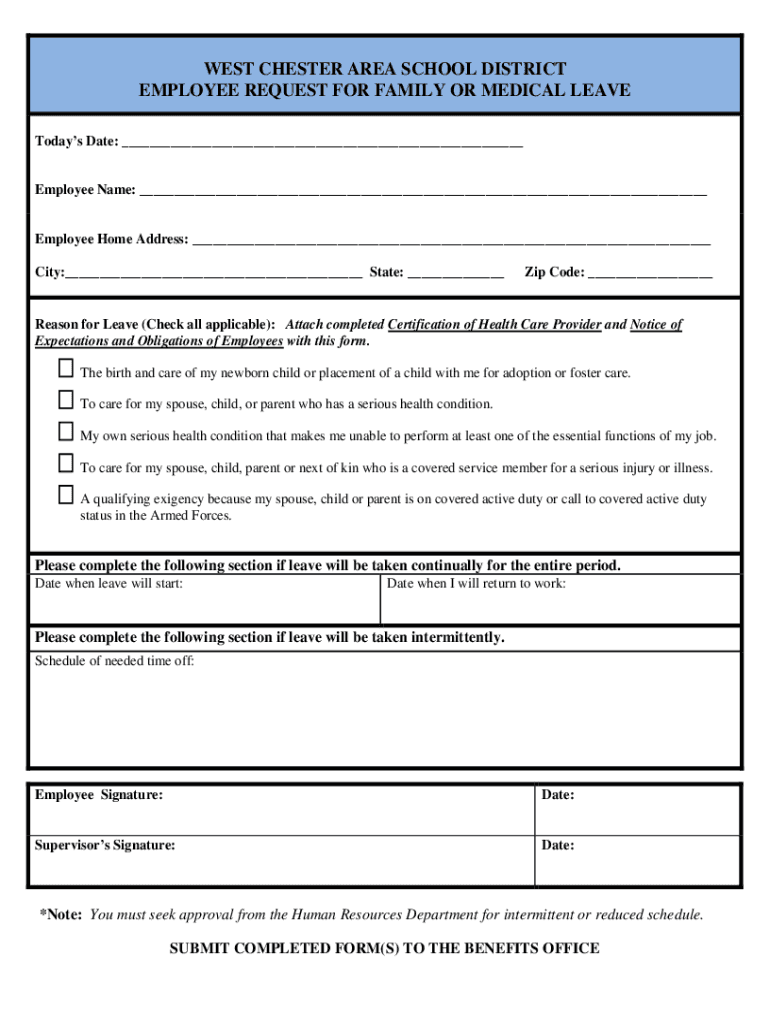FMLA Paperwork Renewal Frequency Guide

Understanding the Family and Medical Leave Act (FMLA) and its paperwork requirements is essential for employees and employers alike. FMLA provides eligible employees with up to 12 workweeks of unpaid, job-protected leave per year. However, the need to renew or recertify FMLA paperwork can often be confusing. In this comprehensive guide, we will explore the frequency of FMLA paperwork renewal, why it's necessary, and how both employees and employers can manage the process effectively.
What is FMLA Paperwork?

FMLA paperwork encompasses several forms and documents:
- Notice of Eligibility and Rights & Responsibilities (WH-381): This form informs employees of their eligibility and the specifics of their rights and responsibilities.
- Designation Notice (WH-382): Used to officially designate the leave as FMLA-qualifying or not.
- Certification Forms: There are different certifications based on the leave type:
- Employee's serious health condition (WH-380-E)
- Family member's serious health condition (WH-380-F)
- Qualifying exigency (WH-384)
- Military caregiver leave (WH-385)
These documents are crucial for ensuring that the leave is used appropriately and to maintain compliance with the law.
When Does FMLA Paperwork Need Renewal?

The frequency of FMLA paperwork renewal depends on several factors:
Annual Renewal

The FMLA entitlement year is defined differently by organizations but can follow one of these methods:
- The Calendar Year (January 1 - December 31).
- The Fixed Year (e.g., July 1 - June 30).
- The 12-Month Period measured backward from the date an employee uses any FMLA leave.
- The Rolling 12-Month Period measured forward from the first day an employee takes FMLA leave.
🗓️ Note: Employers can choose which method suits their operations best, but they must apply it consistently across all employees.
Generally, the FMLA certification must be renewed annually or upon significant changes in the medical condition:
Recertification

Employers can request recertification under the following circumstances:
- Every 30 days unless the employee provides a valid reason why the condition will last longer than 30 days with no significant change.
- When there is a change in circumstances or substantial variation in the frequency or duration of leave, like a change in medical treatment or health condition.
Additionally:
- If the employee seeks intermittent leave for a chronic condition, certification may be needed every six months unless there's a need for earlier recertification.
Second and Third Opinion

Employers may seek a second opinion regarding the initial certification:
- The second opinion's cost must be borne by the employer.
- If the second opinion conflicts, a third opinion can be sought, which is final and binding. The employer and employee must agree on the third healthcare provider.
Managing FMLA Paperwork Renewal

Here are practical steps for managing FMLA paperwork renewal:
For Employees

- Stay Informed: Know your employer's FMLA year definition.
- Submit Timely Certifications: Provide all required medical documentation promptly when requested.
- Track Your Leave: Keep a record of your FMLA leave days to avoid confusion.
For Employers

- Policy Clarity: Clearly communicate the FMLA year definition used in your organization.
- Regular Checks: Establish a system to track when employees' FMLA leaves need recertification or renewal.
- HR Training: Ensure HR staff understands FMLA regulations and manage documentation correctly.
📋 Note: It's beneficial to have HR software or an FMLA tracking system to manage deadlines and notices.
Understanding the FMLA Leave Period

The 12-week leave entitlement under FMLA can be taken in different ways:
- Continuously.
- Intermittently.
- Reduced leave schedule.
This flexibility also affects how paperwork might need to be renewed or updated:
- If leave is taken for a chronic condition, recertification might occur every six months.
- For a condition expected to last indefinitely, longer certification periods can be requested with a valid medical explanation.
The Role of Healthcare Providers

Healthcare providers play a critical role in FMLA paperwork:
- They provide medical certifications.
- They might need to respond to employer inquiries for recertification or clarification.
- They should clearly document expected changes in health conditions or treatments.
Common Pitfalls to Avoid

Here are common errors to avoid when dealing with FMLA paperwork:
Employee Errors

- Not providing medical certifications on time.
- Ignoring employer requests for recertification or clarification.
- Overlooking changes in circumstances that require updated documentation.
Employer Errors

- Requesting recertification too frequently or without proper cause.
- Failing to notify employees of their FMLA rights.
- Not consistently applying the FMLA year definition across the organization.
In managing FMLA paperwork, keeping thorough records, communicating effectively, and understanding the nuances of FMLA requirements are key to avoiding legal and operational issues.
Final Thoughts

Managing FMLA paperwork renewals might seem complex, but with the right knowledge and organization, it becomes much more manageable. Both employees and employers benefit from a clear understanding of when and why FMLA paperwork must be renewed or recertified. This process ensures compliance with federal regulations, protects employees' rights to leave, and minimizes disruption to business operations. Remember, while FMLA is a federal right, the specifics of how paperwork is managed can vary from one workplace to another, hence the importance of staying informed and proactive.
How often should I expect FMLA paperwork renewal?

+
Generally, FMLA certification needs to be renewed annually or upon significant changes in the medical condition. Employers can also request recertification if the initial certification indicates that the condition might change within the next 30 days.
What if my condition improves or worsens?

+
If there’s a significant change in your condition, or if your treatment plan changes, you should notify your employer. This might trigger a need for recertification or an update to your FMLA leave details.
Can my employer request a second opinion regarding my FMLA certification?

+
Yes, if there’s doubt about the validity of the medical certification, an employer may request a second opinion at their expense. If the second opinion conflicts, a third, binding opinion can be sought.